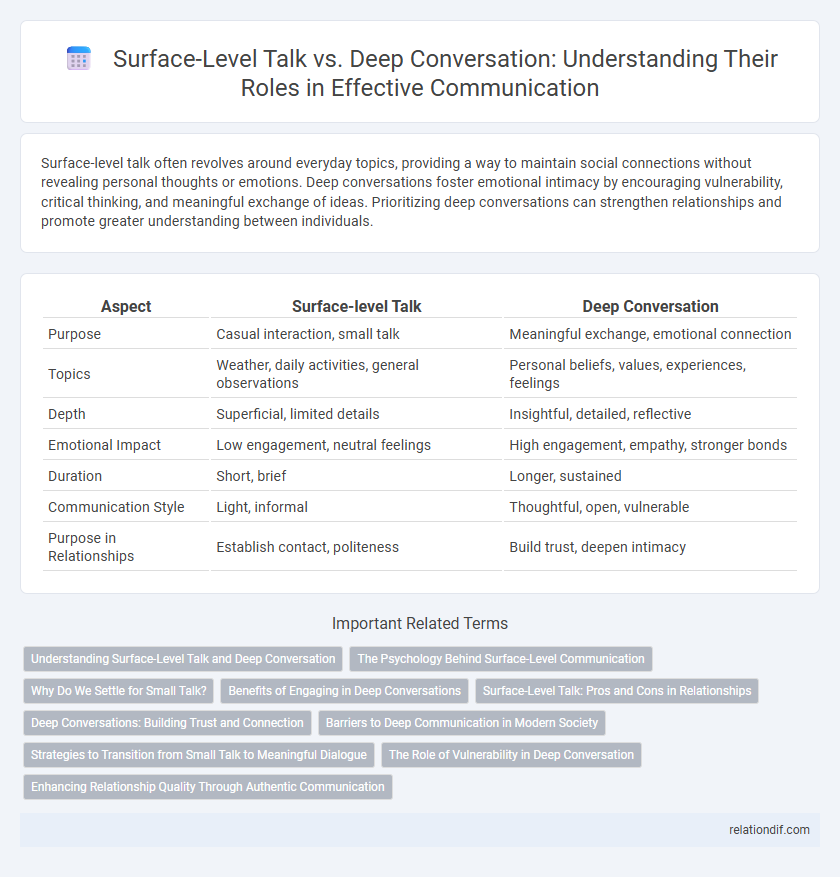Surface-level talk often revolves around everyday topics, providing a way to maintain social connections without revealing personal thoughts or emotions. Deep conversations foster emotional intimacy by encouraging vulnerability, critical thinking, and meaningful exchange of ideas. Prioritizing deep conversations can strengthen relationships and promote greater understanding between individuals.
Table of Comparison
| Aspect | Surface-level Talk | Deep Conversation |
|---|---|---|
| Purpose | Casual interaction, small talk | Meaningful exchange, emotional connection |
| Topics | Weather, daily activities, general observations | Personal beliefs, values, experiences, feelings |
| Depth | Superficial, limited details | Insightful, detailed, reflective |
| Emotional Impact | Low engagement, neutral feelings | High engagement, empathy, stronger bonds |
| Duration | Short, brief | Longer, sustained |
| Communication Style | Light, informal | Thoughtful, open, vulnerable |
| Purpose in Relationships | Establish contact, politeness | Build trust, deepen intimacy |
Understanding Surface-Level Talk and Deep Conversation
Surface-level talk involves casual, everyday exchanges that often focus on external topics such as weather, hobbies, or general observations, providing social lubrication without requiring emotional investment. Deep conversation delves into personal beliefs, values, and experiences, fostering emotional connection and mutual understanding by encouraging vulnerability and active listening. Understanding the differences between these communication styles enhances interpersonal relationships by balancing light interaction with meaningful dialogue.
The Psychology Behind Surface-Level Communication
Surface-level communication often serves as a social lubricant, reducing anxiety and maintaining social harmony by avoiding vulnerability. Psychological theories suggest that this type of talk activates the brain's reward systems without triggering the emotional risks associated with deeper conversations. Understanding these dynamics helps explain why people default to surface-level exchanges in unfamiliar or stressful social environments.
Why Do We Settle for Small Talk?
People often settle for small talk because it requires less emotional vulnerability and social risk, making it a comfortable default in casual interactions. Surface-level conversations help maintain social bonds without exposing personal thoughts or feelings, which can feel safer in unfamiliar or professional settings. This preference reflects a balance between the human need for connection and the instinct to protect one's privacy and emotional well-being.
Benefits of Engaging in Deep Conversations
Engaging in deep conversations fosters stronger emotional connections by promoting vulnerability and authentic self-expression, which enhances trust and empathy between individuals. These meaningful exchanges stimulate critical thinking and broaden perspectives, leading to improved problem-solving skills and personal growth. Regular deep conversations also contribute to better mental health by reducing feelings of loneliness and increasing a sense of belonging and purpose.
Surface-Level Talk: Pros and Cons in Relationships
Surface-level talk in relationships facilitates comfort and quick rapport building by addressing everyday topics and shared experiences. It helps maintain social bonds without the vulnerability required by deep conversation but may lead to misunderstandings or a lack of emotional intimacy over time. Balancing surface-level communication with deeper dialogue is essential for sustaining both connection and trust in long-term relationships.
Deep Conversations: Building Trust and Connection
Deep conversations enhance emotional intimacy by encouraging vulnerability and authentic self-expression, fostering stronger interpersonal bonds. These meaningful exchanges facilitate mutual understanding and empathy, which are crucial for building trust. Engaging in profound dialogue promotes psychological safety, creating a foundation for lasting, genuine connections.
Barriers to Deep Communication in Modern Society
Surface-level talk dominates modern communication due to pervasive distractions like smartphones and social media, which hinder sustained attention and genuine emotional exchange. Cultural emphasis on speed and efficiency reduces opportunities for vulnerability, while fear of judgment creates social barriers that prevent individuals from engaging in deep conversations. These factors collectively erode the quality of interpersonal connections, limiting empathy and personal understanding.
Strategies to Transition from Small Talk to Meaningful Dialogue
Shift from surface-level talk to deep conversation by asking open-ended questions that encourage self-reflection and personal storytelling, fostering emotional connection and trust. Use active listening techniques such as paraphrasing and empathetic responses to validate the speaker's feelings and maintain engagement. Gradually introduce topics related to values, beliefs, or aspirations to deepen the dialogue without overwhelming the other person.
The Role of Vulnerability in Deep Conversation
Vulnerability plays a crucial role in deep conversation by fostering trust and emotional intimacy, enabling participants to share authentic thoughts and feelings beyond surface-level exchanges. This openness encourages meaningful connections and promotes empathy, which are often absent in casual, superficial talk. Embracing vulnerability allows individuals to move past defensive barriers, creating a safe space for honest and transformative dialogue.
Enhancing Relationship Quality Through Authentic Communication
Surface-level talk often involves routine exchanges about daily events, which can create a sense of connection but rarely fosters emotional intimacy. Deep conversations, characterized by sharing personal values, fears, and aspirations, significantly enhance relationship quality by building trust and empathy. Authentic communication rooted in vulnerability promotes stronger bonds and long-lasting relational satisfaction.
Surface-level talk vs Deep conversation Infographic

 relationdif.com
relationdif.com